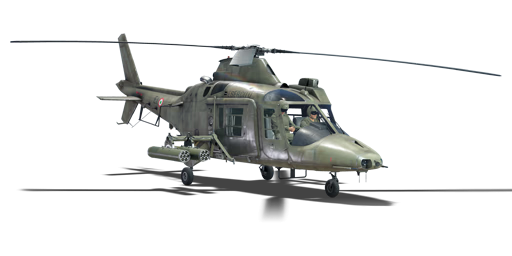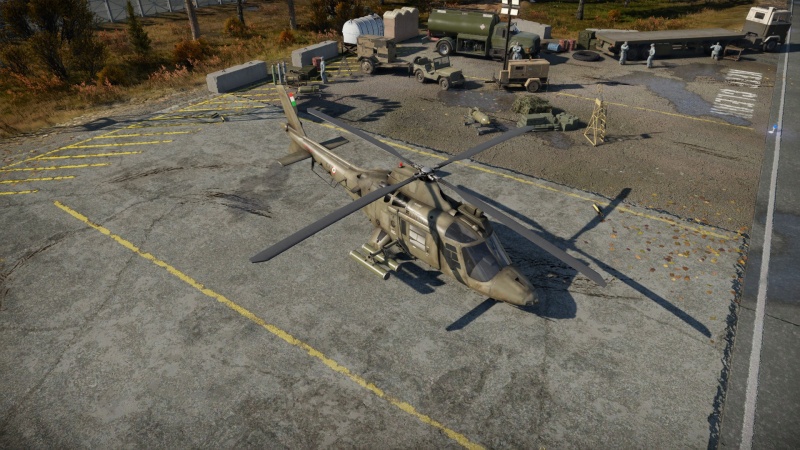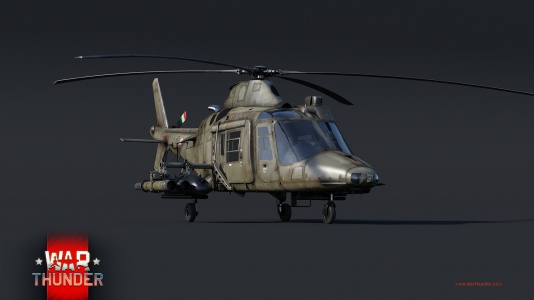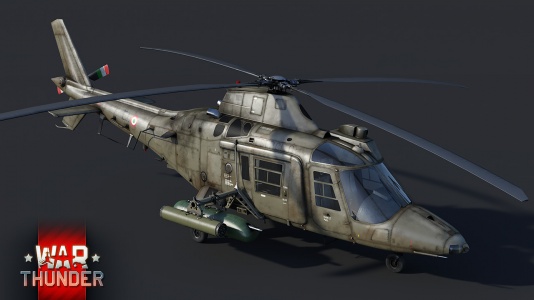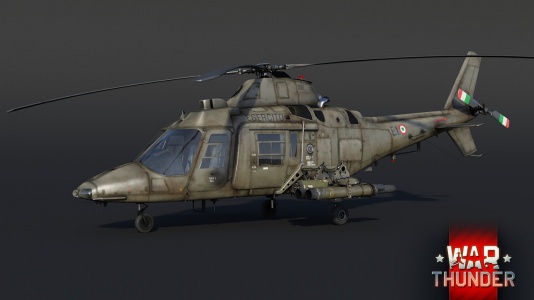Difference between revisions of "A.109EOA-2"
(→Pros and cons) (Tag: Visual edit) |
Colok76286 (talk | contribs) (Edits) |
||
| Line 6: | Line 6: | ||
== Description == | == Description == | ||
<!-- ''In the description, the first part should be about the history of and the creation and combat usage of the helicopter, as well as its key features. In the second part, tell the reader about the helicopter in the game. Insert a screenshot of the vehicle, so that if the novice player does not remember the vehicle by name, he will immediately understand what kind of vehicle the article is talking about.'' --> | <!-- ''In the description, the first part should be about the history of and the creation and combat usage of the helicopter, as well as its key features. In the second part, tell the reader about the helicopter in the game. Insert a screenshot of the vehicle, so that if the novice player does not remember the vehicle by name, he will immediately understand what kind of vehicle the article is talking about.'' --> | ||
| − | The | + | The '''{{Specs|name}}''' is a rank {{Specs|rank}} Italian attack helicopter {{Battle-rating}}. It was introduced in [[Update "Hot Tracks"]]. |
== General info == | == General info == | ||
| Line 63: | Line 63: | ||
=== Pros and cons === | === Pros and cons === | ||
<!-- ''Summarise and briefly evaluate the vehicle in terms of its characteristics and combat effectiveness. Mark its pros and cons in the bulleted list. Try not to use more than 6 points for each of the characteristics. Avoid using categorical definitions such as "bad", "good" and the like - use substitutions with softer forms such as "inadequate" and "effective".'' --> | <!-- ''Summarise and briefly evaluate the vehicle in terms of its characteristics and combat effectiveness. Mark its pros and cons in the bulleted list. Try not to use more than 6 points for each of the characteristics. Avoid using categorical definitions such as "bad", "good" and the like - use substitutions with softer forms such as "inadequate" and "effective".'' --> | ||
| − | |||
'''Pros:''' | '''Pros:''' | ||
| − | * | + | * Can be equipped with 4 x TOW anti-tank missile launchers |
| − | + | * Considerably faster than its counterparts | |
| − | * | + | * Very responsive, usually able to manoeuvre with ease |
| − | |||
| − | * Very responsive, usually able to | ||
| − | |||
| − | |||
'''Cons:''' | '''Cons:''' | ||
| − | * Lacks any form of | + | * Lacks any form of countermeasures |
| − | |||
* Only has access to night vision devices, no thermal imaging. | * Only has access to night vision devices, no thermal imaging. | ||
| − | |||
* Not very survivable | * Not very survivable | ||
| − | |||
| − | |||
== History == | == History == | ||
<!-- ''Describe the history of the creation and combat usage of the helicopter in more detail than in the introduction. If the historical reference turns out to be too long, take it to a separate article, taking a link to the article about the vehicle and adding a block "/History" (example: <nowiki>https://wiki.warthunder.com/(Vehicle-name)/History</nowiki>) and add a link to it here using the <code>main</code> template. Be sure to reference text and sources by using <code><nowiki><ref></ref></nowiki></code>, as well as adding them at the end of the article with <code><nowiki><references /></nowiki></code>. This section may also include the vehicle's dev blog entry (if applicable) and the in-game encyclopedia description (under <code><nowiki>=== In-game description ===</nowiki></code>, also if applicable).'' --> | <!-- ''Describe the history of the creation and combat usage of the helicopter in more detail than in the introduction. If the historical reference turns out to be too long, take it to a separate article, taking a link to the article about the vehicle and adding a block "/History" (example: <nowiki>https://wiki.warthunder.com/(Vehicle-name)/History</nowiki>) and add a link to it here using the <code>main</code> template. Be sure to reference text and sources by using <code><nowiki><ref></ref></nowiki></code>, as well as adding them at the end of the article with <code><nowiki><references /></nowiki></code>. This section may also include the vehicle's dev blog entry (if applicable) and the in-game encyclopedia description (under <code><nowiki>=== In-game description ===</nowiki></code>, also if applicable).'' --> | ||
| − | |||
| − | During the | + | During the 1960s, Agusta was looking to break through the export market by designing the A109. Mainly intended for commercial use and a civilian market, it would be also later be tailored during development to the military market. It was redesigned in 1969 as there was a need for twin engines to actually compete with other contenders: this lead to the A109 to be fitted with 2 Allison 250-C14 turboshaft engines. From December 1968 until September 1969, at least 10 separate possible configurations were worked out. This lead to construction of the first three of the prototypes to carry out flight tests. In 1971, the A109 made its first maiden flight which yielded great results for the machine. The test flight was encouraging both in regards the reduction of vibration and handling qualities, and the overall advantage achieved by adopting an articulated four-blade rotor. Noise abatement was also promising, with an especially designed markedly tapered leading edge of the blade tip section. Testing was halted following a minor accident but quickly resumed in 1972 with to the demand and interest of many countries. Finally, in 1973, the first ever military prototype was presented along with its possibile configurations, This officially changed the vehicle from being centered only for civilian use, and allowed it to gain the reputation of also being for military purposes. Many tests were conducted on the military versions of the A109, the first set of armaments being equipped on them were Hughes Aircraft-built anti-tank TOW missiles. The A109 was also tested with a wide variety of rockets, machine guns and any weaponry that could be installed on the machine. Between 1976 and 1977, the tests that were conducted allowed 2 different military variants to emerge, one of them being for light attack/close support missions and the other one for shipboard operations. Once Agusta's helicopter was ready, many civilian versions of this aircraft started being exported around the globe, mainly in the Middle East and Africa. In Italy, the Army obtained the A109CM as the "A109EOA" utility/scout helicopter, with "EOA" standing for "Elicottero d'Osservazione Avanzata". This helicopter's entry into service helped put out of service the very old Agusta-Bell helicopters that were, at the time, still used in a multi-role aspect. In Italian service, the A109 was able to carry rockets, various ATGMs, and gunpods. The launchers installed on the A109 allowed for the installation of TOW, ITOW, TOW2 and TOW2A missiles. Other armaments included 12.7 mm general purpose door-mounted machine guns on both sides of the helicopter, allowing the vehicle to be very versatile and well-defended. Initial variants of the A109 usually lacked any form of countermeasures, but would be installed in more modern variants of the helicopter. It was in service for a very long time, and was liked by the people who operated the vehicle. Some export variants of the A109 included special options such as the A109BA, which was exported to Belgium, equipped with 8 x TOW launcher instead of the 4 x one in service in Italy. Currently, 32 additional countries are using the A109 either in civilian or military configurations. The A109 keeps on being in service and continues to be upgraded to not lag behind other countries' types of helicopters till this day. |
=== [[wt:en/news/6989-development-italian-helicopters-en|Devblog]] === | === [[wt:en/news/6989-development-italian-helicopters-en|Devblog]] === | ||
| Line 96: | Line 86: | ||
== Media == | == Media == | ||
<!-- ''Excellent additions to the article would be video guides, screenshots from the game, and photos.'' --> | <!-- ''Excellent additions to the article would be video guides, screenshots from the game, and photos.'' --> | ||
| + | |||
| + | ;Skins | ||
| + | * [https://live.warthunder.com/feed/camouflages/?vehicle=a_109_eoa2 Skins and camouflages for the {{PAGENAME}} from live.warthunder.com.] | ||
;Images | ;Images | ||
Revision as of 19:09, 25 May 2021
Contents
Description
The A.109EOA-2 is a rank VI Italian attack helicopter with a battle rating of 8.7 (AB/RB) and 9.3 (SB). It was introduced in Update "Hot Tracks".
General info
Flight performance
Describe how the helicopter behaves in the air. Speed, manoeuvrability, acceleration and allowable loads - these are the most important characteristics of the vehicle.
| Characteristics | Max Speed (km/h at 1,000 m) |
Max altitude (metres) | |
|---|---|---|---|
| AB | RB | ||
| Stock | 256 | 239 | 5400 |
| Upgraded | ___ | ___ | |
Survivability and armour
Examine the survivability of the helicopter. Note how vulnerable the structure is and how secure the pilot is, whether the fuel tanks are armoured, etc. Describe the armour, if there is any, and also mention the vulnerability of other critical systems.
Modifications and economy
Armaments
Suspended armament
The A.109EOA-2 can be outfitted with the following ordnance:
- 28 x FFAR Mighty Mouse rockets
- 2 x 12.7 mm FN M3P machine guns (500 rpg = 1,000 total)
- 2 x 12.7 mm FN M3P machine guns + 6 x FFAR Mighty Mouse rockets
- 2 x 12.7 mm FN M3P machine guns + 14 x FFAR Mighty Mouse rockets
- 2 x 12.7 mm FN M3P machine guns + 20 x FFAR Mighty Mouse rockets
- 4 x BGM-71C Improved TOW missiles
- 4 x BGM-71C Improved TOW missiles + 14 x FFAR Mighty Mouse rockets
- 2 x 12.7 mm FN M3P machine guns + 4 x BGM-71C Improved TOW missiles
- 2 x 12.7 mm FN M3P machine guns + 4 x BGM-71C Improved TOW missiles + 6 x FFAR Mighty Mouse rockets
Usage in battles
Describe the tactics of playing in a helicopter, the features of using the helicopter in a team and advice on tactics. Refrain from creating a "guide" - do not impose a single point of view, but instead, give the reader food for thought. Examine the most dangerous enemies and give recommendations on fighting them. If necessary, note the specifics of the game in different modes (AB, RB, SB).
Pros and cons
Pros:
- Can be equipped with 4 x TOW anti-tank missile launchers
- Considerably faster than its counterparts
- Very responsive, usually able to manoeuvre with ease
Cons:
- Lacks any form of countermeasures
- Only has access to night vision devices, no thermal imaging.
- Not very survivable
History
During the 1960s, Agusta was looking to break through the export market by designing the A109. Mainly intended for commercial use and a civilian market, it would be also later be tailored during development to the military market. It was redesigned in 1969 as there was a need for twin engines to actually compete with other contenders: this lead to the A109 to be fitted with 2 Allison 250-C14 turboshaft engines. From December 1968 until September 1969, at least 10 separate possible configurations were worked out. This lead to construction of the first three of the prototypes to carry out flight tests. In 1971, the A109 made its first maiden flight which yielded great results for the machine. The test flight was encouraging both in regards the reduction of vibration and handling qualities, and the overall advantage achieved by adopting an articulated four-blade rotor. Noise abatement was also promising, with an especially designed markedly tapered leading edge of the blade tip section. Testing was halted following a minor accident but quickly resumed in 1972 with to the demand and interest of many countries. Finally, in 1973, the first ever military prototype was presented along with its possibile configurations, This officially changed the vehicle from being centered only for civilian use, and allowed it to gain the reputation of also being for military purposes. Many tests were conducted on the military versions of the A109, the first set of armaments being equipped on them were Hughes Aircraft-built anti-tank TOW missiles. The A109 was also tested with a wide variety of rockets, machine guns and any weaponry that could be installed on the machine. Between 1976 and 1977, the tests that were conducted allowed 2 different military variants to emerge, one of them being for light attack/close support missions and the other one for shipboard operations. Once Agusta's helicopter was ready, many civilian versions of this aircraft started being exported around the globe, mainly in the Middle East and Africa. In Italy, the Army obtained the A109CM as the "A109EOA" utility/scout helicopter, with "EOA" standing for "Elicottero d'Osservazione Avanzata". This helicopter's entry into service helped put out of service the very old Agusta-Bell helicopters that were, at the time, still used in a multi-role aspect. In Italian service, the A109 was able to carry rockets, various ATGMs, and gunpods. The launchers installed on the A109 allowed for the installation of TOW, ITOW, TOW2 and TOW2A missiles. Other armaments included 12.7 mm general purpose door-mounted machine guns on both sides of the helicopter, allowing the vehicle to be very versatile and well-defended. Initial variants of the A109 usually lacked any form of countermeasures, but would be installed in more modern variants of the helicopter. It was in service for a very long time, and was liked by the people who operated the vehicle. Some export variants of the A109 included special options such as the A109BA, which was exported to Belgium, equipped with 8 x TOW launcher instead of the 4 x one in service in Italy. Currently, 32 additional countries are using the A109 either in civilian or military configurations. The A109 keeps on being in service and continues to be upgraded to not lag behind other countries' types of helicopters till this day.
Devblog
In the early 70's, the Italian aircraft manufacturer Agusta began testing a new multi-purpose helicopter, the A.109, which was originally created for the civilian market, but immediately drew the attention of the military authorities. A.109 EOA-2 is a reconnaissance version, designed to destroy various targets including enemy armored vehicles. In addition to machine-gun pods and rockets, the helicopter can be equipped with four TOW anti-tank missile launchers.
Media
- Skins
- Images
- A.109EOA-2 Devblog Images
- Videos
See also
Links to the articles on the War Thunder Wiki that you think will be useful for the reader, for example:
- reference to the series of the helicopter;
- links to approximate analogues of other nations and research trees.
External links
| Agusta | |
|---|---|
| Utility | AB 205 A-1* · A.109EOA-2 |
| Attack | A-129 International (p) · A129CBT · AH-129D · T129** |
| Export | HKP3C |
| See Also | Bell Aircraft Corporation · TAI |
| *Licensed · **Partnership with TAI | |
| Italy helicopters | |
|---|---|
| Utility | AB 205 A-1 · A.109EOA-2 |
| Attack | A-129 International (p) · A129CBT · AH-129D · T129 |
| Hungary | ◔Mi-24D · ◔Mi-24V · ◔Mi-24P |


